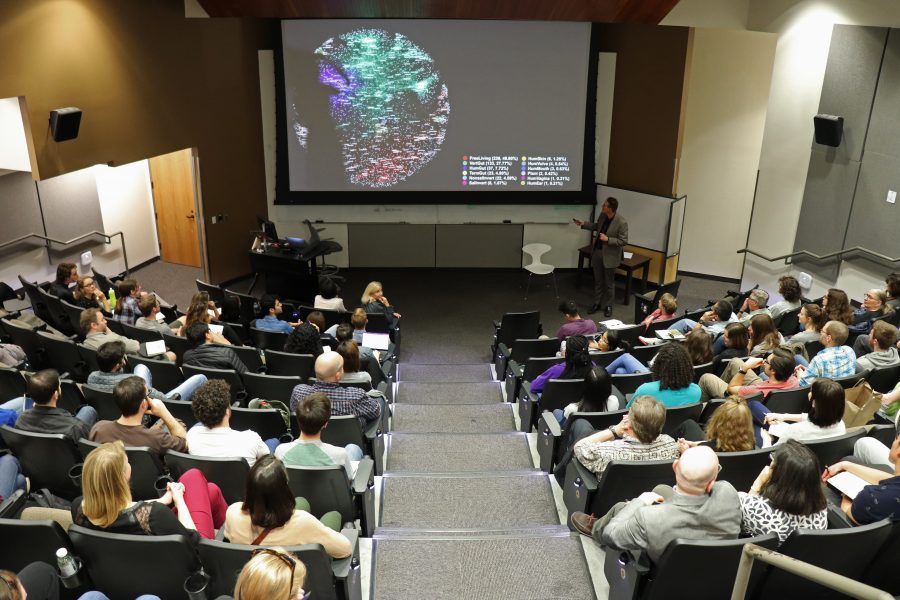Two million genes make you, you, but only 1 percent are human.
This past Thursday, Rob Knight, a renowned world leader in microbiome research from the University of California San Diego, gave the esteemed Jean Andrew Centennial Visiting Professor Lecture at the Hogg Auditorium. Knight leads the American Gut Project, one of the largest citizen science projects in the nation, the goal of which is to establish causal links between the interplay of bacteria in our gut with the proliferation of health conditions and lifestyle factors, such as obesity and autism.
Knight began by asking the audience what they see when they look in the mirror every day — to illustrate that of the 20,000 human genes that comprise every unique member of our species, there are 2,000,000 more microbial genes within each of us, all of which play a decisive role in our health and development from birth.
Ranging from how any individual responds to antibiotics to one’s likelihood for obesity, Knight said healthcare neglects viewing 99 percent of the human system, as the budding field of microbiome research is still young.
“The gut is not Vegas,” Knight said. “What happens in the gut does not stay in the gut. We gamble with it everyday.”
The relationship between diet and gut health, and gut health with overall health goes beyond the mantra of “you are what you eat.” Instead, Knight likens these relationships to a quote from Jeffery Bland, the founder of The Institute of Functional Medicine: “Food is a language that speaks to our genes.”
As one would expect, the food most associated with overall health improvement was yogurt, which lead to a decrease of 0.82 lbs per year when consumed regularly. The most disastrous food is also Americans’ leading source of vitamin C: French fries, which led to a 1.69 lb weight gain per year when consumed multiple times a week.
However much autonomy the individual has in impacting their current gut health, the way we are born determines the microbiome we begin life with. Current research points out that those born by Cesarean section are more prone to a broader ranges of allergies, as well as an increased potential for autism.
“Dr. Knight is the world expert on a microbiome and the analysis on microbiomes from … the human body or an organism that resides in the gut,” said Molly Bray, the chair of the Department of Nutritional Sciences. “He studies (microbiomes) across the globe. There is interest in them right now because it has been shown that many, many diseases have been linked to the microbiome, such as type one diabetes.”
Knight expressed this point of research with a dot-cluster chart showing microbes found in four primary areas: oral, skin, vaginal and fecal. Of the samples collected from children of cesarean section births, microbes that were collected from skin and oral samples were actually plotted away from all four clusters in a “no man’s land,” indicating a possibly threatening misplacement of essential bacteria.
One unexpected fix to this was the application of amoxicillin, a common antibiotic used to treat ear infections, strep throat, pneumonia and more. When test subjcets took a standard, weeklong dosage, all bacteria sampled from them after were then found to be in the correct cluster, illustrating both the fragility and malleability of these systems.
“(Knight’s) talk was very informative and interesting,” said public health freshman Carolyn Henein, who attended the talk. “My favorite part was when he linked the microbiomes to various diseases”.
Drawing towards the end of the lecture, Knight spoke of microbiome diversity and what causes it. Both aging and proper sleep are crucial contributors, allowing healthy bacteria to flourish within us, in turn providing the adaptability to respond to perturbations caused by foreign pathogens associated with illness.
Another way to aid in diversity and solve specific illnesses, and not for the squeamish, is a fecal transplant. Healthy stool provided from a donor can be administered using a tube that runs from your nose to stomach, or through your rear, much like a simple colonoscopy. Despite the inherent disgust one might feel about the operation, fecal transplants are useful for those who suffer from Clostridium difficile, often referred to as C. diff, a bacterial infection of the colon most commonly contracted in hospitals. These transplants have continued to outperform typical antibiotic treatments across the board.
Here Knight concluded by displaying the effectiveness and range of microbial treatments, and the future health benefits and cures that can come from their application. He envisions a future where we will be able to monitor our gut health with “smart toilets” and a mobile phone app which will receive an active readout of our microbiome, helping us to predict diseases and influence our diet.
“It’s very science fiction, I get it,” Knight said. “Just try not to laugh at it, but I do think it is the future.”















